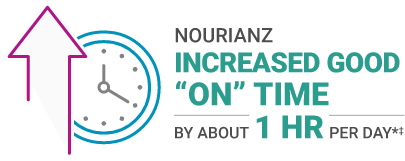NOURIANZ® is
an
add-on treatment
for “off” episodes.
NOURIANZ works together with
your current levodopa/carbidopa
regimen to reduce “off” episodes
in Parkinson’s disease (PD).
Actor Portrayal
NOURIANZ is the first and only treatment for “off” episodes in Parkinson’s disease (PD) that lifts the brake of adenosine
The exact way NOURIANZ® (istradefylline) works to treat “off” episodes in PD is unknown, but unlike any other medication for PD, NOURIANZ is believed to work by targeting adenosine A2A receptors.
This is like lifting the brake in a car, helping to increase movement if you are experiencing “off” time.
NOURIANZ was shown to reduce “off” time in clinical trials
In clinical trials:
- All patients were on levodopa. Most were also taking other Parkinson’s disease (PD) medications. All of them were still experiencing “off” time
- All patients in the trials were given NOURIANZ or placebo (sugar pill) in addition to their other PD medications
At 12 weeks, NOURIANZ reduced “off” time
significantly more than placebo, based on
diaries of people living with PD in
clinical studies.*†
*Average “off” time at the start of the study was about 6 hours per day.
†In Study 3 and Study 4.

- NOURIANZ 20 mg reduced “off” time by 0.99-1.31 hours per day
- NOURIANZ 40 mg reduced “off” time by 0.96-1.58 hours per day
- Placebo reduced “off” time by 0.23-0.66 hours per day
Additional data suggests that NOURIANZ may increase good “on” time without uncontrolled, sudden movements
Input from the diaries of people in clinical studies living with Parkinson’s disease suggests that NOURIANZ may increase good “on” time, which is “on” time without uncontrolled, sudden movements at 12 weeks.‡ A change in good “on” time was a secondary efficacy endpoint.
“On” time is when medication is working
to treat symptoms such as slowness, stiffness,
or issues with mobility.
‡In Studies 1-4.

- NOURIANZ 20 mg increased good “on” time by 1.09-1.35 hours per day
- NOURIANZ 40 mg increased “on” time by 0.21-1.29 hours per day
- Placebo increased “on” time by 0.49-0.80 hours per day
‡In Studies 1-4.
The safety profile of NOURIANZ has been demonstrated in multiple clinical studies
People taking NOURIANZ may experience:
- Uncontrolled movements (dyskinesia)
- Dizziness
- Constipation
- Nausea
- Hallucinations
- Problems sleeping (insomnia)
NOURIANZ and other medicines may affect each other causing side effects. NOURIANZ may affect the way other medicines work, and other medicines may affect how NOURIANZ works.
Talk to your doctor if you experience
any of these side effects.
Track your “off” episodes
with the Doctor Discussion
Guide and talk to your doctor
to see if NOURIANZ is right
for you.
Discussion Guide
In clinical studies, the number of patients who stopped taking NOURIANZ due to side effects was similar to that of patients taking placebo (sugar pill)
- The incidence of patients discontinuing for any adverse reaction was 5% for NOURIANZ 20 mg, 6% for NOURIANZ 40 mg, and 5% for placebo
- 1% of patients discontinued NOURIANZ due to dyskinesia, compared to 0% of patients on placebo
- In patients treated with NOURIANZ 40 mg, 1% discontinued because of hallucinations, compared to 0% for placebo and 0% for patients treated with NOURIANZ 20 mg
NOURIANZ, in combination with levodopa, may cause dyskinesia or exacerbate pre-existing dyskinesia. The incidence of dyskinesia was 15% for NOURIANZ 20 mg, 17% for NOURIANZ 40 mg, and 8% for placebo, in combination with levodopa.
What is NOURIANZ?
NOURIANZ is a prescription medicine used with levodopa and carbidopa to treat adults with Parkinson’s disease (PD) who are having “off” episodes. It is not known if NOURIANZ is safe and effective in children.
Important Safety Information
Before you take NOURIANZ, tell your healthcare provider about all your medical conditions, including if you:
- have a history of abnormal movement (dyskinesia)
- have reduced liver function
- smoke cigarettes
- are pregnant or plan to become pregnant. NOURIANZ may harm your unborn baby
- are breastfeeding or plan to breastfeed. It is not known if NOURIANZ passes into breast milk. You and your healthcare provider should decide if you will take NOURIANZ or breastfeed
Tell your healthcare provider about all the medicines you take, including prescription and over-the-counter medicines, vitamins, and herbal supplements.
NOURIANZ and other medicines may affect each other causing side effects. NOURIANZ may affect the way other medicines work, and other medicines may affect how NOURIANZ works.
What are the possible side effects of NOURIANZ?
NOURIANZ may cause serious side effects, including:
- uncontrolled sudden movements (dyskinesia). Uncontrolled sudden movements is one of the most common side effects.
- hallucinations and other symptoms of psychosis. NOURIANZ can cause abnormal thinking and behavior, including:
- being overly suspicious or feeling people want to harm you (paranoid ideation)
- believing things that are not real (delusions)
- seeing or hearing things that are not real (hallucinations)
- confusion
- increased activity or talking (mania)
- disorientation
- aggressive behavior
- agitation
- delirium (decreased awareness of things around you)
- unusual urges (impulse control or compulsive behaviors). Some people taking NOURIANZ get urges to behave in a way unusual for them. Examples of this are unusual urges to gamble, increased sexual urges, strong urges to spend money, binge eating, and the inability to control these urges.
If you notice or your family notices that you are developing any new or unusual symptoms or behaviors, talk to your healthcare provider.
The most common side effects of NOURIANZ include uncontrolled movements (dyskinesia), dizziness, constipation, nausea, hallucinations, and problems sleeping (insomnia).
These are not all the possible side effects of NOURIANZ.
Call your doctor for medical advice about side effects. You may report side effects to FDA at 1-800-FDA-1088 or www.fda.gov/medwatch.
Please see Patient Information for NOURIANZ.



